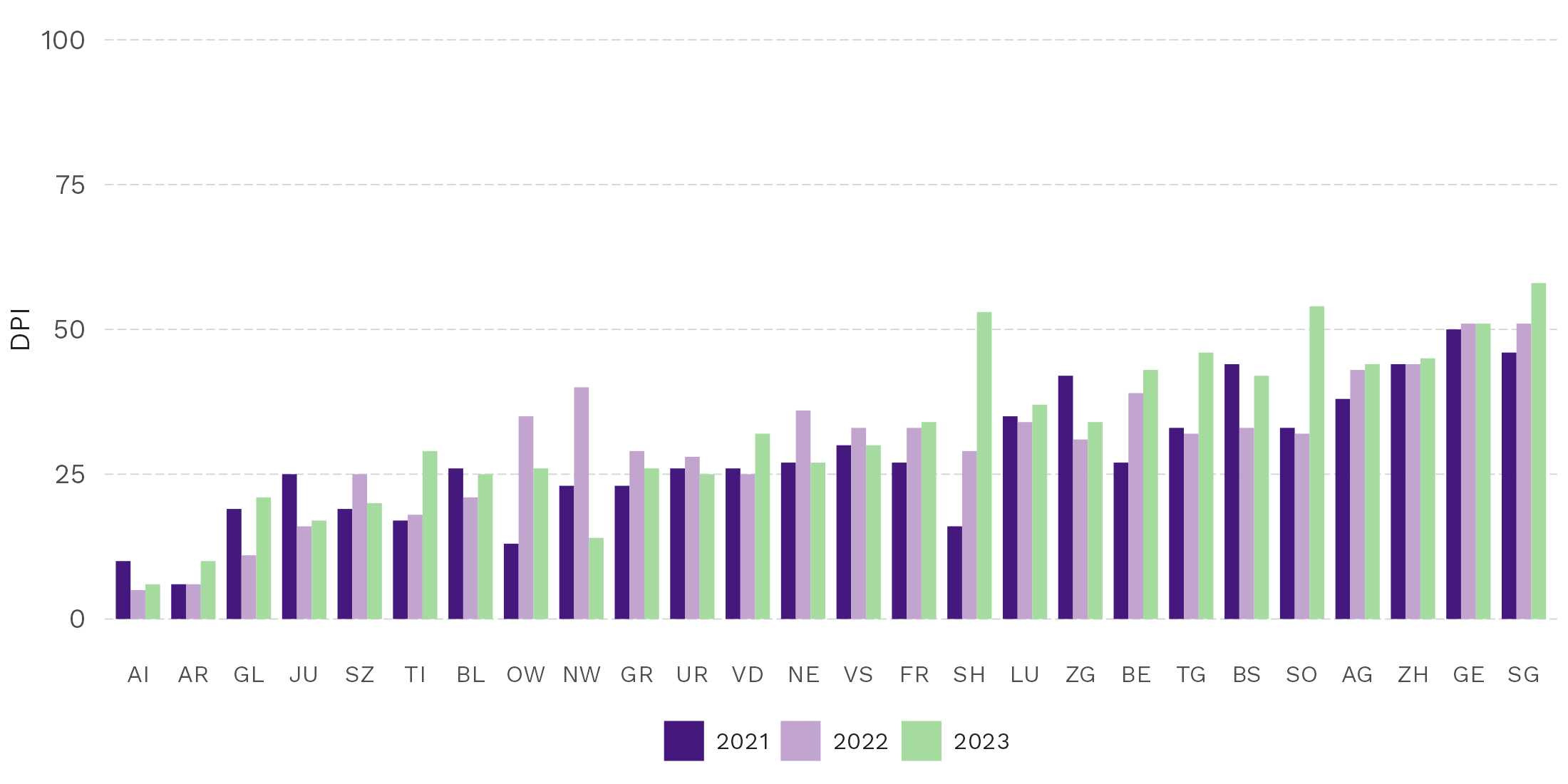Digital participation – cooperation between the cantons is needed
Gabriel Hofmann, Uwe Serdült
31st January 2024

On a scale of 0 to 100, the DigiPart-Index measures the extent to which it is possible to participate digitally in political processes in Switzerland’s cantons. In the third survey year, the average score across all cantons remains relatively low. For the third time in a row, the top and bottom cantons differ by a factor of ten. While little has changed in terms of digital participation in the cantons in the bottom group over the past three years, there has been a further increase in the top group this year. This is partly due to the reintroduction of e-voting.
Digital forms of political participation such as e-voting or online surveys are increasingly supplementing conventional forms such as ballot papers and printed forms throughout Switzerland. This corresponds to the digital experience of ever broader sections of the population. Accordingly, an interdisciplinary team of researchers is therefore compiling an index for Switzerland that records digital political participation and provides a comparable picture of digital participation opportunities in the cantons. The index is recorded in a standardized value range. The values for the DigiPart Index Switzerland range from 0 to 100 points and cover the dimensions of «opinion-forming», «participation» and «decision-making».
Increasing differences between the cantons
In the third year of the DigiPart Index survey, the differences between the cantons are still considerable and have even increased slightly. A minimum of 6 to a maximum of 58 points were achieved. The average value is 33 points. Smaller rural cantons tend to be in the bottom group and only offer very limited instruments for digital political participation. But even in the top group, there is room for further development, particularly in the category of e-demand, where there are currently only private platforms such as «petitio» or «weCollect».
Figure 1. DigiPart Index Switzerland: Values for all cantons in Switzerland on a scale of 0-100 for the years 2021 to 2023.

Figure: Alix d’Agostino, DeFacto • Data : www.digipartindex.ch
While the top cantons are in the high middle range of the DigiPart Index, there has been little change in the cantons in the bottom group over the past three years. In view of such large differences, caution is required to ensure that the smaller and less resourced cantons are not left behind. For example, by strengthening (technical) cooperation between the cantons so that smaller cantons can benefit from the know-how of the larger cantons. Apart from in the area of e-demand, technical solutions are already available in the individual cantons. Through mutual learning, these could also be used in other cantons. In small-scale and multilingual Switzerland, such cooperation is particularly relevant with a view to the future. This is demonstrated by the rapid development of new software such as ChatGPT. Such developments will influence the field of political participation in digital form.
Participating institutions
The research team consists of members from the Center for Democracy Aarau (ZDA), the Procivis Think Tank, the Institute for Communication and Public Policy and the Institute for Digital Technologies in Communication at the Università della Svizzera italiana. The index is updated annually. The report and data sets are available on the website http://digipartindex.ch.
To the press release of the Aarau Democratic Centre
Media inquiries
German: Uwe Serdült, uwe.serdult@zda.uzh.ch, +41 79 818 68 48 or Gabriel Hofmann, hofmann@zda.uzh.ch, +41 78 922 21 77
French: Marine Benli-Trichet, marinecharlotte.trichet@zda.uzh.ch, +41 76 574 27 06
Italian: Anna Picco-Schwendener, anna.picco.schwendener@usi.ch, +41 76 439 94 96
English: Costa Vayenas, vayenas@procivis.ch, +41 79 700 70 00
The investigation
Costa Vayenas, Marine Benli-Trichet, Gabriel Hofmann, Stefan Kalberer, Anna Picco-Schwendener Uwe Serdült, Jean-Patrick Villeneuve and Jonas Wüthrich (2023): DigiPartIndex Switzerland 2023. Aarau, Zurich and Lugano Center for Democracy Aarau (ZDA), Procivis Think Tank and Università della Svizzera italiana (USI). Link: https://digipartindex.ch/de/blog/digipartindex_2023/
About the project
The DigiPartIndex Switzerland makes it possible to measure and compare the status and development of opportunities for digital political participation in the cantons of Switzerland. The DigiPartIndex international is in the pilot phase and allows the comparison of countries. The project is funded by the «Digitalization + Society» program of the Mercator Foundation Switzerland.
About the Center for Democracy Aarau (ZDA)
The Center for Democracy Aarau is a scientific research center supported by the University of Zurich, the University of Applied Sciences Northwestern Switzerland, the Canton of Aargau and the City of Aarau. It conducts basic research and deals with current issues relating to democracy – regionally, in Switzerland and worldwide. Link: www.zdaarau.ch
About the Procivis Think Tank
The mission of the Procivis Think Tank is to investigate the impact of digital technologies on democracy and to contribute to the development of innovative solutions with regard to the digitalization of services in the public sector and democracy. Link: www.procivis.ch/think-thank
About the Institute of Communication and Public Policy and the Institute of Digital Technologies of Communication of the Università della Svizzera italiana
The Institute for Communication and Public Policy and the Institute for Digital Technologies of Communication are research centers of the Università della Svizzera italiana in Lugano. Their research activities lie at the interface of communication, citizenship and technology and aim to link conceptual theories with practical applications. Link: www.usi.ch/en/research/institutes